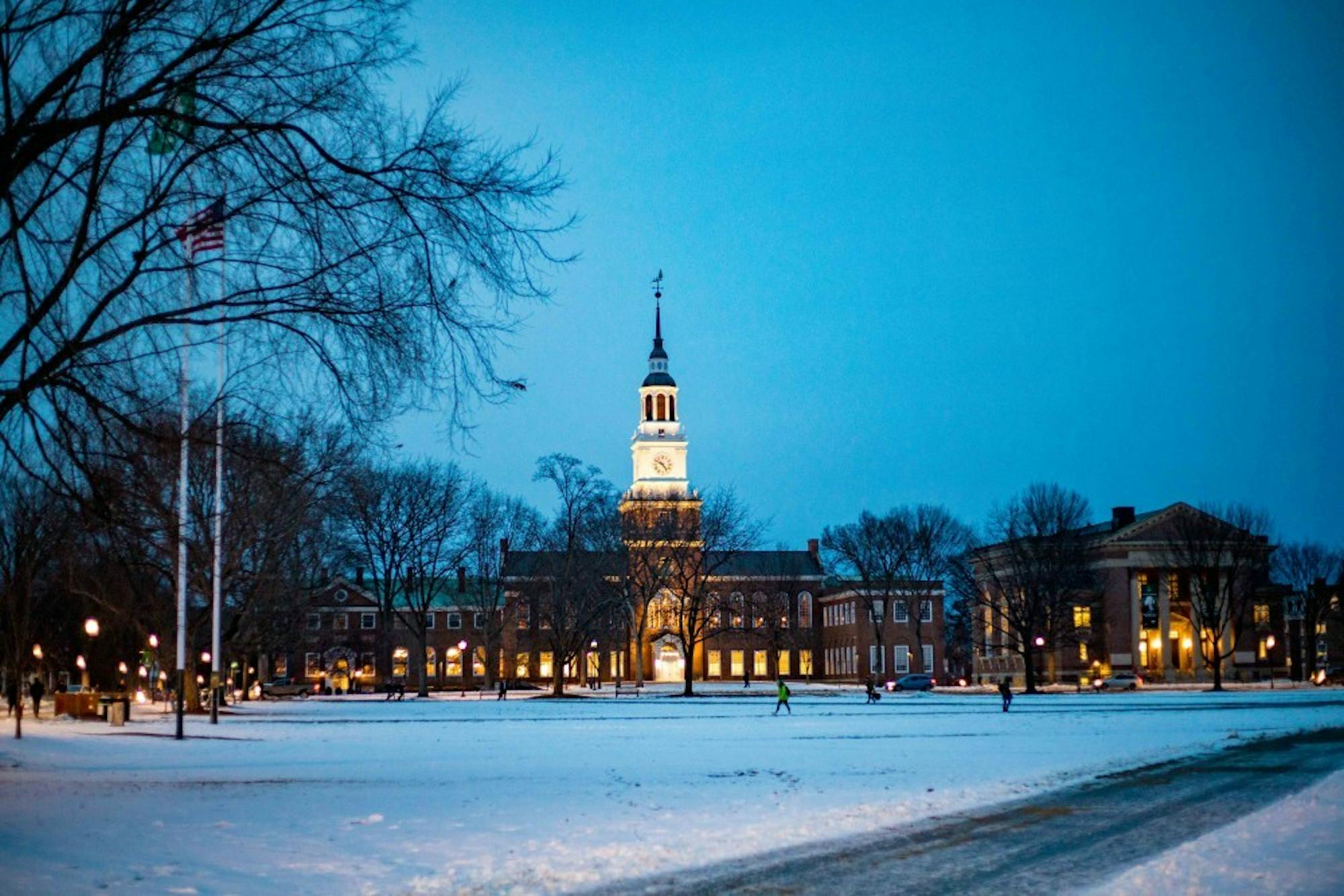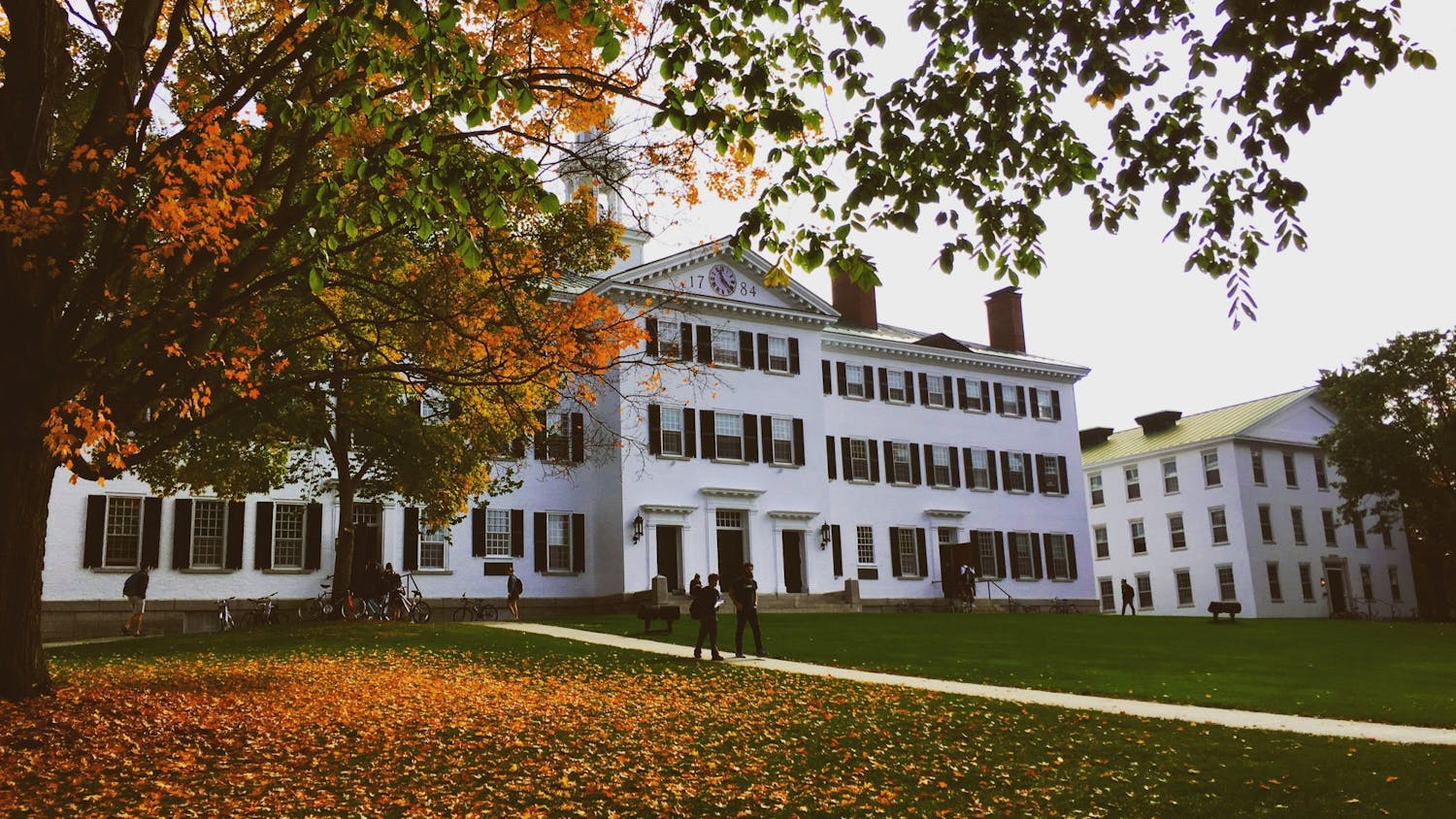Though most Dartmouth students returned home for winter break, 84 students remained on campus for the entirety of the interim and will stay there through the first two weeks of winter term, before the campus officially allows students to move in. Facing restricted dining hall hours and limited opportunities for social interaction, some say they spent the interim grappling with issues around food and isolation.
Perry Zhang ’24 described the atmosphere around campus as a “ghost town” and “apocalyptic.” Zhang, who is from Beijing, stayed on campus because it would have been “logistically difficult” to get back home and then return for winter term, and plane tickets are “quite expensive.” However, being alone on campus has presented its own host of challenges.
Vico Lee ’24 noted that about three people in total live in his building, and he is the only resident on his floor.
“The other day I saw a person walking downstairs and I was like, ‘Oh, human!’ Then, the other day, I met someone else in the building and she was just as shocked as I was,” he said.
The sparse campus has led Shandukurai Chiuswa ’24 to worry about students’ mental health.
“People’s mental health is really at stake,” Chiuswa said. “... If I’m going through something and might not get the people to talk to or be around someone — that can be a pretty hard time for anyone.”
In an effort to help students’ well-being, the College has permitted those living on campus over break to enter residence halls other than their own — a change from fall term rules that will continue into winter term. Some common spaces, such as Baker-Berry Library and Collis Center, were open earlier in the break, but were closed when the College officially closed for winter break between Dec. 18 and Jan. 4, according to College spokesperson Diana Lawrence.
In the absence of open common spaces, some students found company at Dartmouth Outing Club events, such as socially distanced campfire gatherings. Elliot Ng ’21, who has been leading some of the DOC’s activities, said that the events have been well-attended, with around five or six students plus two leaders at each event.
Students have also expressed frustration with some aspects of on-campus meals.
During the first half of the interim, students could pick up their food from the Class of 1953 Commons between 11:30 a.m. and 1 p.m., and again from 5 p.m. until 6:30 p.m. most days of the week, according to Dartmouth Dining director Jon Plodzik. However, the dining hall is closed on weekends and holidays over the interim, so there were various days when students were expected to pick up multiple meals to reheat and eat later.
When the College was closed for the holidays from Dec. 18 to Jan. 4, fresh cooked meals were swapped for frozen ones. The dining hall was open for pickup about twice a week, meaning that students picked up as many as six meals at once.
“The meals during those days are actually chilled meals that are full meals ready to go. … There are beverages, desserts and salads — probably more food than we could eat in a weekend,” Plodzik said, adding that Dartmouth Dining shifted to frozen meals in order to “give some of the dining staff the holidays that they deserve to be off.”
Students are required to pay for an interim meal plan — which costs $24 per day — in order to stay on campus, though they are not charged room and board. They are not able to opt out of the interim meal plan if they are living on campus in College residences, and they cannot opt in if they are living off campus.
Plodzik wrote in an email that the meal plan is mandatory because “it is the only method to ensure campus opening and no food insecurity,” as it enables students to have food delivered to them should they be placed in isolation.
In addition to price, some students, like Lee, said they have struggled with the relatively narrow timeframe for picking up meals.
“I have job meetings on Tuesdays and from 5 p.m. to around 6:15 p.m., and that sucks because I have to somehow rush to get my food in the back when [’53 Commons] closes at 6:30 p.m,” Lee said.
Others said that when they have had to pick up multiple meals to eat over multiple days, the food became unappealing.
“I have not been able to eat my food on Sundays because after 36 hours you can reheat your food, but it’s not going to taste appetizing, and it’s a quality of life versus bare minimum,” Ng said.
Clinical service coordinator Dominique Walton manages a community food pantry in the basement of Dick’s House. There, both on-campus and off-campus undergraduate and graduate students can find a variety of food, including granola bars, fruits, milk, bread products, vegetables and canned goods.
Though the pantry is accessible “24/7, 365 days a year,” Walton said they saw a large number of donations leading up to winter break. All students who use the pantry can remain anonymous.
Walton added that with the “abundance of donations that have come in this term,” such as from Student Assembly, Health Services and graduate students, she recently started stocking personal hygiene items.
In addition to aid provided by the College, Student Assembly gave out $35 gift cards for the Hanover Co-op to undergraduates living on-campus or in the Upper Valley area. Local organizations have also provided on-campus students with support. For example, the Women of Dartmouth Upper Valley organization and the Dartmouth Club of the Upper Valley delivered care packages for students on campus, with items such as cookies and gift cards for local stores.
Additionally, Ng has helped to coordinate weekly drives to grocery stores and has collaborated with the Sustainability Office to distribute winter apparel to students who need it. He is also currently working on an effort to provide proper kitchenware for students who may not have access to pots and pans.
Ng said it was “disappointing” that students were organizing these initiatives rather than the College.
“None of these things are the students’ jobs,” Ng said. “None of us get paid. We’re all just listening in and trying to understand.”
Dean of the College Kathryn Lively wrote via email that two student representatives from the International Students Association met with her to discuss their concerns over the lack of fresh produce and lack of vegan and vegetarian options available over interim, which she wrote is “a concern that students have even in normal years.”
“The students, themselves, felt like [Dartmouth Dining] heard them and would be working towards improving the experience,” Lively said.
However, undergraduates remain frustrated with the administration for allowing issues around food and other concerns to worsen.
“I think the struggle is for the administration to hear us and actually provide what we need and not make us beg for every little thing,” Sirajum Sandhi ’21 said. “We shouldn’t have to go hungry because of dietary restrictions.”





